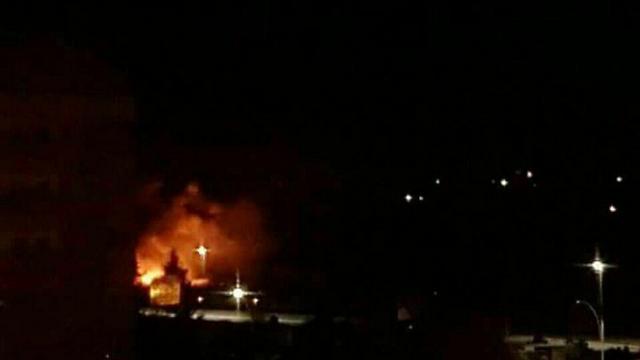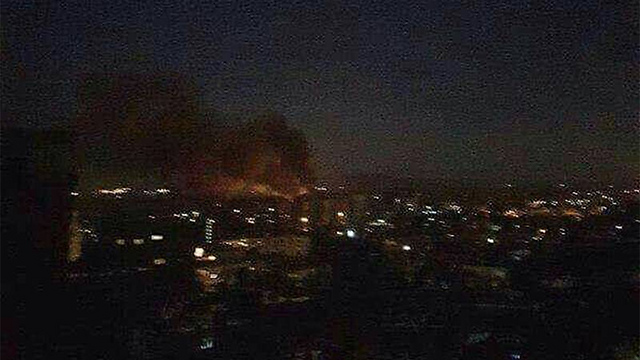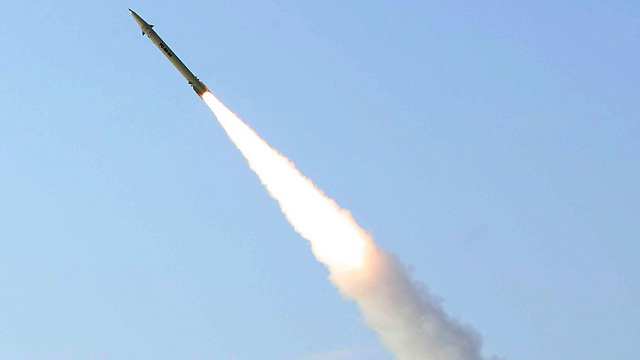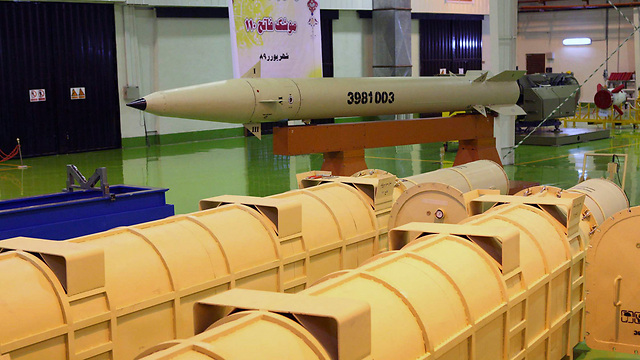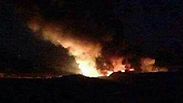
Israel’s war on Hezbollah’s accurate missiles
Analysis: All signs indicate that the strike attributed to the IAF in the Damascus area early Friday was aimed at destroying a shipment of accurate Iranian surface-to-surface missiles, which threaten most essential facilities in Israel. This is part of the war between wars, in which the IDF is supposedly trying to minimize casualties and damage in the next battle with Hezbollah.
This can be concluded from the claim that the attacked targets were near the airport and from the knowledge that Iran transfers the missiles it supplies to Hezbollah through cargo planes that land in the Damascus area, and mainly in the military airport which is located not far from the Lebanon border.
Hezbollah leader Hassan Nasrallah and senior commanders of Iran’s Revolutionary Guards announced recently that the Lebanese organization was receiving missiles, and even accurate missiles, from Iran—likely satellite-guided missiles (GPS) that could reach central and even southern Israel and threaten most of the essential facilities and civilian and military airports in the State of Israel.
They were likely referring to improved Fateh-111 or Fateh-110 missiles, and maybe even Zelzal missiles that are produced in Iran, which have a range of 200-300 kilometers (125-186 miles). Their warhead weighs about 400 kilograms (880 pounds). Hezbollah has already declared that it plans to use these missiles to attack the General Staff at the Kirya Base in Tel Aviv and other essential targets across Israel.
The accuracy of these missiles can hit targets within a radius of only several meters, instead of hundreds of meters with unguided missiles. For this reason, Israel is interested in reducing the number of such missiles in Hezbollah’s possession. The higher the number of accurate missiles in the hands of Nasrallah’s people, the greater Hezbollah’s ability to target more and more essential facilities in a conflict with Israel and deal more losses on Israeli territory.
According to reports from oppositional sources in Syria, early Friday’s strike also included military facilities in the Jabal Qasiun area, the mountain range overlooking Damascus where many military camps and facilities are located. If facilities were indeed attacked on Mount Qasiun, they were likely, at least according to Syrian opposition sources, missile depots and antiaircraft systems intended to serve Hezbollah’s aerial defense system.
An interesting fact is that the Syrian general staff noted in its official statement that the strike was carried out by Israel Air Force planes which circled the Sea of Galilee area, but did not enter Syrian airspace. According to the Syrians, these planes launched accurate guided missiles at the targets near the airport in the Damascus area. The images from the area of the strike indicate that the attack was indeed carried out using accurate means, as there were many additional bombings in the area and maybe even casualties.
The Syrians are interested in emphasizing the fact that Israel did not enter their airspace, so that they will not have to explain why the strike attributed to Israel was carried out successfully without the Syrians targeting the planes or disrupting their activity. On the other hand, if the strike was indeed carried out by the IAF, Israel has no interest and no need to enter Syrian territory in order to attack targets in the Damascus area, so as to avoid friction with the antiaircraft systems and the planes operated by Russia on Syrian territory.
It’s a known fact that very accurate air-to-surface missiles can be launched from distances of dozens and even hundreds of kilometers and hit the target at an accuracy of 1 or 2 meters. There are of course additional reports from the Syrian opposition about F-35 IAF planes which attacked for the first time, but it’s safe to assume that even if the IAF did use planes, the Syrian opposition sources had no way of detecting and knowing that.
Damaging Hezbollah’s abilities
Israel, presumably, has no interest in clarifying the uncertainty, and so the IDF is keeping quiet. Apart from keeping operational information confidential, Israel is not interested in challenging the Syrians in a way which will call for a response on their part. While the Syrians specifically announced that the strike was carried out by Israel, as they have been doing recently, if Israel refrains from claiming responsibility – the possibility of an escalation is reduced.
The Syrian general staff already announced in the past, in the assassination of murderer Samir Kuntar in a Damascus suburb, that Israeli planes had attacked Syria while circling the Sea of Galilee. It was. In that incident too, the Syrians claimed that the strike was carried out by missiles.
The victory in Aleppo has instilled confidence in the Damascus regime and in its security forces, with Russian and Iranian backing. Today, they appear less sensitive and less afraid of an Israeli response, which is why Israel must take the Syrian general staff’s promise to respond seriously.
These may be empty words like in the past, but in light of the recent successes in the war against the rebels, it’s quite possible that the Syrian army will try to implement some sort of retaliation, whether in the Golan Heights or in northern Israel. The IDF is aware of that and is preparing for such a possibility. One thing is clear: The damage caused by the attack early Friday near the Mezzeh Airport appears to be big and will significantly harm Hezbollah’s ability to target Israeli territory.
Experts say this is part of the war between wars, in which the IDF is supposedly trying to minimize casualties among the civilian population and damage the essential facilities in Israel, in case a war breaks out. It’s a Sisyphean battle which has to be waged constantly, as the other side is also finding ways and means to smuggle improved, high-quality weapons to Hezbollah. That is exactly what Israel is trying to thwart – both vis-à-vis Hezbollah and vis-à-vis Hamas.










